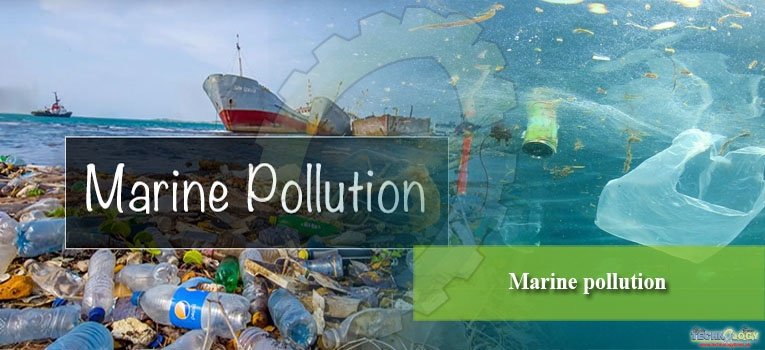Global marine pollution is posing serious threat to wide diversity of marine life. One of the foremost concern has been the impact of global warming and climate change that has direct impact on the sea level rise threatening.

The virtual existence of many island nations in the Pacific, Atlantic and the Indian oceans like Solomon Islands, Marshall Islands, Fuji, Vanuatu, Madagascar, Seychelles, Maldives, Sri Lanka, Guam to mention only a handful names. Several low lying areas around coastal zones with heavy human settlements like parts of coastal Bangladesh, India, Indonesia, Thailand, the Philippines etc are particularly vulnerable to sea level changes that could result in unprecedented human saga if tragedy strikes.
The frequency and density of traffic movement across major global seas and oceans are also particularly worrisome. With increase of marine trade and commerce around the globe ocean liners carrying huge volumes of crude oil and other export and import products are running from one port to another to boost global trade.
Unfortunate accidents on these high traffic marine corridors have also increased significantly resulting in accidental dumping of crude oil and other toxic chemicals into the oceans disrupting and damaging marine ecosystems and environment drastically with irreparable long term damages pushing many marine vertebrates and invertebrates towards extinction. Oil spills have been one of the most common causes of major marine disasters around the planet.
Significant factors impacting marine pollution
Furthermore, the geopolitical tensions between major global powers have also increased several folds over the past four decades. As a consequence, increased traffic off naval forces as well as marine security groups has further increased the volume of marine traffic. The fear of insurgents and pirates attacking commercial ocean going vehicles have increased patrolling in all the major ocean’s commercial routes increasing the level of pollution in the water through leakage as well as dumping of solid and liquid waste.
The increased numbers of ocean cruisers for tourists to enjoy life in the seas and oceans have been another culprit in destroying sensitive marine ecosystems by over crowding. This has also increased load of toxic chemicals and harmful pathogens in the marine water jeopardizing marine ecosystems.
Another important aspect of marine pollution has been a huge amount of plastics and related plastic products being increasingly found in different marine ecosystems around the globe. They have even moved into complex marine food chains and food webs making marine life vulnerable to serious, long term environmental consequences.
No seas and oceans around the globe is free of plastic pollution and the oceanic currents have been carrying plastics from one region to another making situation worse by stimulating pollution in sensitive marine sanctuaries and habitats. Numerous reports of death of unfortunate marine mammals by choking due to accidental consumption of such floating plastic wastes have been heart breaking. Floating plastic wastes have also been known to introduce unwanted pathogens, exotic pests and parasites into sensitive marine ecosystems.
Role of agriculture in marine pollution
Extensive use of agricultural chemicals in our agricultural fields for securing high crop productivity has also been directly and indirectly impacting the seas and oceans. The excess chemicals used in the agricultural fields are being washed away both by irrigation water as well as rain into a adjoining rivers and streams.
This in turn carries them downstream into vast open oceans as a natural geologic process. However, the impact has been dramatic and traces of various toxic agricultural chemicals have been detected in the ocean; that has negatively impacted several sensitive marine ecosystems and marine biodiversity negatively.
Level of damage
With the unprecedented increase in global human population, there is been a high demand for seafood and seafood based products to sustain these populations. As a consequence several married mammals as well as fishes and reptiles are facing challenges to survive. Over exploitation, over harvesting, over capturing and non-judicious use of marine natural resources has placed serious question marks for many vulnerable and endangered marine species and placed critical, negative anthropogenic pressure on marine biodiversity.
Marine mammals like whales, dolphins, porpoises, seals, dugongs, manatees, walruses, polar bears are all being pushed hard for their bare survival. Several species of marine fishes, reptiles (sea turtles), molluscs, echinoderms, coelenterates, platyhelminths, nemathelminths are showing signs of alarming decline.
The future
The death of non target, bystander species while fishing target commercial species have been reported to be abnormally high! Death of marine mammals, birds and sea turtles getting entangled in fishing net is sad and unacceptable. Collision with fishing vehicles has been another important factor killing spectacular marine life and seriously damaging marine biodiversity.
The drag nets used indiscriminately around the planet is damaging sea floor and marine ecosystems evolved over millions of years. In several cases, many countries have been pushed to enact laws to prevent over exploitation of specific species to avoid them becoming extinct. The situation has been turning from bad to worse; and if nothing is done now, we may not be able to save many marine vertebrates and invertebrates, marine biodiversity and marine ecosystems in the not so distant future.